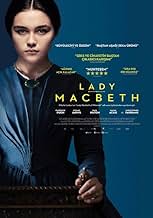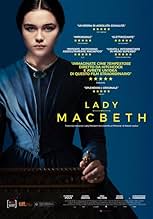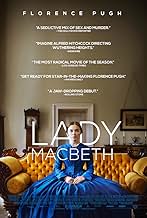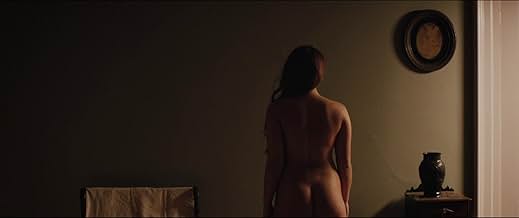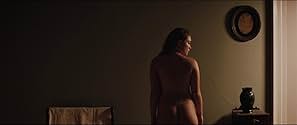AVALIAÇÃO DA IMDb
6,8/10
29 mil
SUA AVALIAÇÃO
Na Inglaterra rural do século XIX, uma jovem noiva que foi vendida para o casamento descobre um desejo incontrolável dentro de si mesma quando embarca em uma aventura com um trabalhador da p... Ler tudoNa Inglaterra rural do século XIX, uma jovem noiva que foi vendida para o casamento descobre um desejo incontrolável dentro de si mesma quando embarca em uma aventura com um trabalhador da propriedade do marido.Na Inglaterra rural do século XIX, uma jovem noiva que foi vendida para o casamento descobre um desejo incontrolável dentro de si mesma quando embarca em uma aventura com um trabalhador da propriedade do marido.
- Direção
- Roteiristas
- Artistas
- Indicado para 2 prêmios BAFTA
- 24 vitórias e 58 indicações no total
Kema Sikazwe
- Farmhand
- (as Kema Slkazwe)
- Direção
- Roteiristas
- Elenco e equipe completos
- Produção, bilheteria e muito mais no IMDbPro
Avaliações em destaque
If I were the producer of this film, I'd have chosen a different title. I'm sure lots of moviegoers are going to be misled: this film has nothing to do with Shakespeare. It's an adaptation of a novel by the Russian author Nikolai Leskov, set in early 19th century England.
The film seems to be a pre-feminism manifesto for women's rights. It shows Katherine Lester, the submissive wife of a wealthy but abusive landowner, living in a secluded manor in the British countryside. During a prolonged absence of her husband, she rediscovers her freedom and starts an affair with one of the stable boys. Not willing to give up her newly acquired status, she starts a series of increasingly extreme actions.
The interesting thing is how Katherine evolves from victim to culprit. She seems to have learned from her husband how to use and misuse power. The lack of social conscience of which she at first is a victim, becomes a driving force for her own behaviour. Her selfishness and lack of morality is so extreme that, in the end, she betrays innocent servants. The viewer has to shift his allegiances: at first, it's impossible not to sympathize with Katherine, enjoying a free life without her heartless husband. But halfway through the film, it becomes clear that Katherine is just as heartless, as soon as she is in power.
The story is filmed in a very effective, sober style with beautiful cinematography. The lack of any music is remarkable: some elongated scenes are striking because of the silence. The oppressive atmosphere in the manor is emphasized by the camera work. The camera repeatedly shows scenes from exactly the same viewpoint. Four or five times, we see the servant Anna entering Katherine's bedroom in exactly the same way.
As much as 'Lady Macbeth' is about gender, it is also about class. It is striking that Katherine, who as a woman is considered a lower form of human life by men, herself considers the servants to be a lower form of human life. She shamelessly uses them for her own purposes and enjoyment, but doesn't care at all about their fate afterwards.
'Lady Macbeth' is a beautiful film, about issues that even nowadays are worth thinking about. But I would have named it 'Lust and loneliness' - after all, it's set in the same period as the Jane Austen novels.
The film seems to be a pre-feminism manifesto for women's rights. It shows Katherine Lester, the submissive wife of a wealthy but abusive landowner, living in a secluded manor in the British countryside. During a prolonged absence of her husband, she rediscovers her freedom and starts an affair with one of the stable boys. Not willing to give up her newly acquired status, she starts a series of increasingly extreme actions.
The interesting thing is how Katherine evolves from victim to culprit. She seems to have learned from her husband how to use and misuse power. The lack of social conscience of which she at first is a victim, becomes a driving force for her own behaviour. Her selfishness and lack of morality is so extreme that, in the end, she betrays innocent servants. The viewer has to shift his allegiances: at first, it's impossible not to sympathize with Katherine, enjoying a free life without her heartless husband. But halfway through the film, it becomes clear that Katherine is just as heartless, as soon as she is in power.
The story is filmed in a very effective, sober style with beautiful cinematography. The lack of any music is remarkable: some elongated scenes are striking because of the silence. The oppressive atmosphere in the manor is emphasized by the camera work. The camera repeatedly shows scenes from exactly the same viewpoint. Four or five times, we see the servant Anna entering Katherine's bedroom in exactly the same way.
As much as 'Lady Macbeth' is about gender, it is also about class. It is striking that Katherine, who as a woman is considered a lower form of human life by men, herself considers the servants to be a lower form of human life. She shamelessly uses them for her own purposes and enjoyment, but doesn't care at all about their fate afterwards.
'Lady Macbeth' is a beautiful film, about issues that even nowadays are worth thinking about. But I would have named it 'Lust and loneliness' - after all, it's set in the same period as the Jane Austen novels.
I'm not familiar with the Lady Macbeth of Mtsensk short story by Nikolai Neskov (not to be confused with Lady Macbeth by William Shakespeare) which he wrote as a novella in 1865, although it is inspired by the famous play.
the book inspired Shostakovich to write an opera based on it.
Now we have a British film that feels incredibly French (incredibly Michael Haneke, who I think is actually Austrian) to add to its cannon.
It features a career defining performance by Florence Pugh in the title role; although the men are magnificent too (most notably Christopher Fairbanks as the intolerant Father in Law).
If you like Christopher Fairbanks through his Guardians of the Galaxy fame this is not the movie for you as it moves at glacial pace with very little dialogue, virtually no music and a LOT of fixed frames where you are invited to enjoy the cinematography in its most bleak and spartan Northernness.
"It's grim up north" might have been the poster slogan for this movie because, set as it is near the North East of England's colliery land, albeit on the moors (North Yorkshire I'd suggest), it is most certainly grim.
The story is murderously grim too and I'd expect this BBC Films production to be in the running when next year's BAFTA's are handed out with Florence Pugh a shoe in for best female actor.
Slow but sublime with excellent direction from William Oldroyd.
the book inspired Shostakovich to write an opera based on it.
Now we have a British film that feels incredibly French (incredibly Michael Haneke, who I think is actually Austrian) to add to its cannon.
It features a career defining performance by Florence Pugh in the title role; although the men are magnificent too (most notably Christopher Fairbanks as the intolerant Father in Law).
If you like Christopher Fairbanks through his Guardians of the Galaxy fame this is not the movie for you as it moves at glacial pace with very little dialogue, virtually no music and a LOT of fixed frames where you are invited to enjoy the cinematography in its most bleak and spartan Northernness.
"It's grim up north" might have been the poster slogan for this movie because, set as it is near the North East of England's colliery land, albeit on the moors (North Yorkshire I'd suggest), it is most certainly grim.
The story is murderously grim too and I'd expect this BBC Films production to be in the running when next year's BAFTA's are handed out with Florence Pugh a shoe in for best female actor.
Slow but sublime with excellent direction from William Oldroyd.
As "Lady Macbeth" (2016 release from the UK; 90 min.) opens, we see a young woman (we later learn her name is Katherine) getting married in what looks to be 19th century England. On her wedding night, she is left untouched by her (older) husband. Her father-in-law, also living there, is equally unpleasant. Katherine is utterly lonely and depressed. Then one day, both her husband and father-in-law must go out of town for business. It's not long before Katherine strikes up a torrid affair with one of the groomsmen. At this point we're about 10 min. into the movie. What will become Katherine and her lover? To tell you more of the plot would spoil your viewing experience, you'll just have to see for yourself how it all plays out.
Couple of comments: you may think this is yet another movie adaptation of the Shakespeare play, but in fact this is based on the Russian novel Lady Macbeth of the Mtsensk District by Nicolai Leskov. I will leave it to the Shakespeare experts to comment how different this story is from Shakespeare's. What I can say is this: the movie is very much story-driven. Things happen, and happen fast, and it doesn't let up! There is hardly any music in the film. Another unusual fact: the movie does not have a title. There are no opening credit, and when the end titles start, it simply says "Based on Lady Macbeth of the Mtsensk District by Nicolai Leskov", and that's it. (The Katherine character is regularly referred to as "Mrs. Lester" or maybe that should be "Leicester".) The star of the movie for sure is Florence Pugh, an up-and-coming British actress, whom I can assure you we will see plenty more of (she reminds me of a young Kate Winslett). Played by Pugh, Katherine is passionate and ruthless. Last but not lest, the movie was filmed (according to the end titles) in Northumberland, the area just below the border with Scotland, just beautiful.
"Lady MacBeth" premiered at the 2016 Toronto International Film Festival to positive buzz. It finally opened this weekend at my local art-house theater here in Cincinnati, and I couldn't wait to see it. The Friday early evening screening where I saw this at was attended dismally (4 people, including myself), which does not bode well for this movie, considering it was the opening night. That's a shame. Maybe this will gather a larger audience through Amazon Instant Video, or eventually on DVD/Blu-ray. If you like a strong story-driven movie with great acting, you could do a lot worse than this particular "Lady MacBeth"!
Couple of comments: you may think this is yet another movie adaptation of the Shakespeare play, but in fact this is based on the Russian novel Lady Macbeth of the Mtsensk District by Nicolai Leskov. I will leave it to the Shakespeare experts to comment how different this story is from Shakespeare's. What I can say is this: the movie is very much story-driven. Things happen, and happen fast, and it doesn't let up! There is hardly any music in the film. Another unusual fact: the movie does not have a title. There are no opening credit, and when the end titles start, it simply says "Based on Lady Macbeth of the Mtsensk District by Nicolai Leskov", and that's it. (The Katherine character is regularly referred to as "Mrs. Lester" or maybe that should be "Leicester".) The star of the movie for sure is Florence Pugh, an up-and-coming British actress, whom I can assure you we will see plenty more of (she reminds me of a young Kate Winslett). Played by Pugh, Katherine is passionate and ruthless. Last but not lest, the movie was filmed (according to the end titles) in Northumberland, the area just below the border with Scotland, just beautiful.
"Lady MacBeth" premiered at the 2016 Toronto International Film Festival to positive buzz. It finally opened this weekend at my local art-house theater here in Cincinnati, and I couldn't wait to see it. The Friday early evening screening where I saw this at was attended dismally (4 people, including myself), which does not bode well for this movie, considering it was the opening night. That's a shame. Maybe this will gather a larger audience through Amazon Instant Video, or eventually on DVD/Blu-ray. If you like a strong story-driven movie with great acting, you could do a lot worse than this particular "Lady MacBeth"!
Frances Pugh is the gravitational force of this film; not simply filling the role, but her presence consuming the other characters, the building to which she is confined for most of the film and the shots she inhabits even when silent. In that respect, it's a performance that reminds me of Glenn Close's brilliant turn as the central character in The Wife, a role and film that have more similarities to this than one might first think. That's not to say her performance is greedy - far from it, it has a remarkably understated power; and the rest of the cast act without ego, with great subtlety to all how her to shine in the way in which her role demands. The purpose of the title is only occasionally and vaguely apparent for much of the film, but comes into horrible and brilliant focus in the final act; it's a title the central character earns. But it's the silences that haunt the most and lend this film its creeping power - the background silence of a stately home in the middle of rural northern England; the silence of the house itself; the silence of key characters; and most of all Florence Pugh's silence as she fills the screen, motionless and noiseless in a series of near but not quite identical shots that punctuate the film like refrains, lending a quiet kind of awe to the devastating ending.
You've been sold off into a marriage, not made in heaven, to a man who sees you only as possession, life has ended now for you, you should do, what you're told to, that's sit all day, a little pray, absorb oppression. But desires are on fire and you need passion, there are shackles that you need to have unfastened, and Sebastian's the key, can unlock all misery, by removing all unsatisfied frustration. It's not just clothes that are discarded and come off, soon the wheels of the carriage are all troughed, discretion lets you down, but you're tough, and don't bow down, although your actions may make one or two souls scoff.
Brilliant, Florence Pugh is absolutely fantastic!!!
Brilliant, Florence Pugh is absolutely fantastic!!!
Você sabia?
- CuriosidadesFlorence Pugh said she loved her nude scenes in this film. Pugh reflected on her breakout role during an interview for Britain's ES Magazine and admitted the part "changed everything" for her. "I loved the fact she was naked all the time. At that point in my life, I had been made to feel shit about what I looked like and that film was perfect. There was no room for me to feel insecure."
- Erros de gravaçãoA Cornish Rex cat first appears at 14:30. The breed first appeared around 1950.
- ConexõesFeatured in The EE British Academy Film Awards (2018)
- Trilhas sonorasPraise to the Lord, the Almighty
(uncredited)
German folk tune
Lyrics by Joachim Neander, translated by Catherine Winkworth
Principais escolhas
Faça login para avaliar e ver a lista de recomendações personalizadas
- How long is Lady Macbeth?Fornecido pela Alexa
Detalhes
- Data de lançamento
- Países de origem
- Centrais de atendimento oficiais
- Idioma
- Também conhecido como
- Леді Макбет
- Locações de filme
- Lambton Castle, Chester-le-Street, County Durham, Inglaterra, Reino Unido(The Lesters' home)
- Empresas de produção
- Consulte mais créditos da empresa na IMDbPro
Bilheteria
- Orçamento
- £ 500.000 (estimativa)
- Faturamento bruto nos EUA e Canadá
- US$ 1.129.408
- Fim de semana de estreia nos EUA e Canadá
- US$ 64.537
- 16 de jul. de 2017
- Faturamento bruto mundial
- US$ 5.343.632
- Tempo de duração1 hora 29 minutos
- Cor
- Proporção
- 2.39 : 1
Contribua para esta página
Sugerir uma alteração ou adicionar conteúdo ausente






